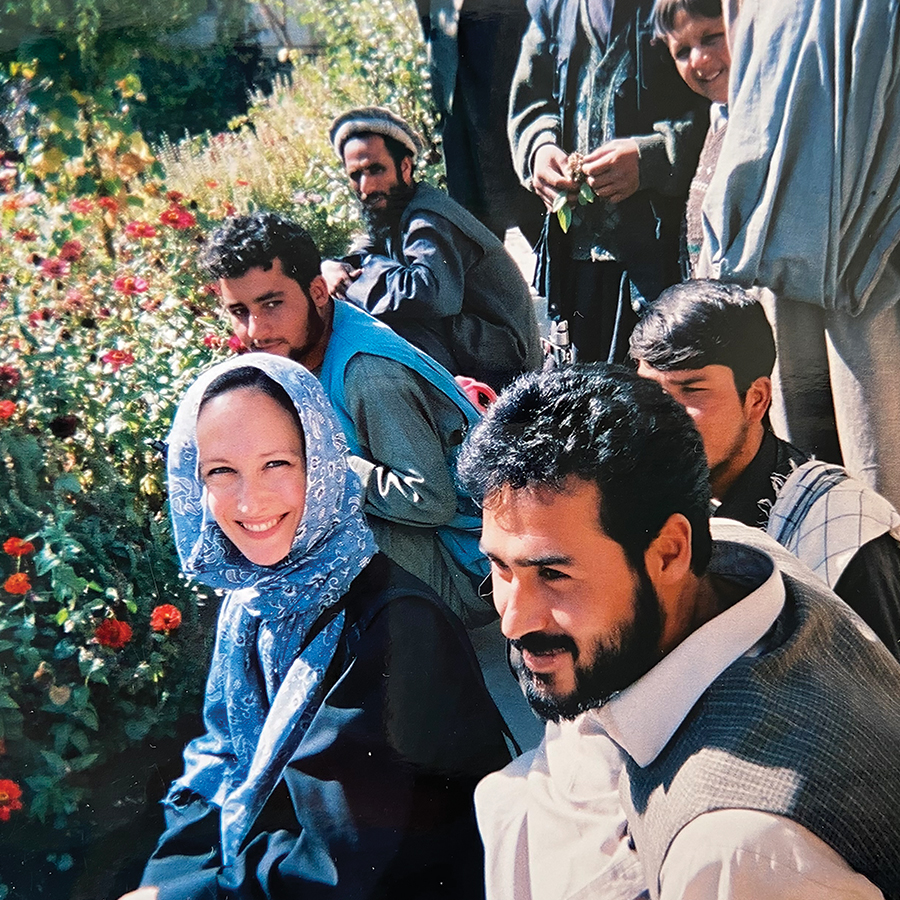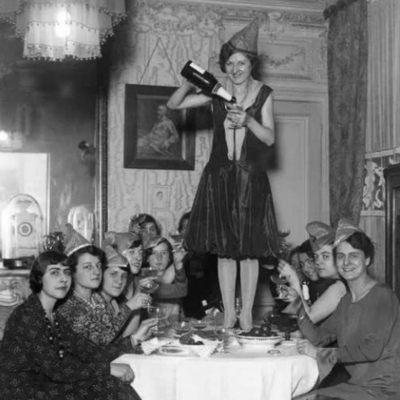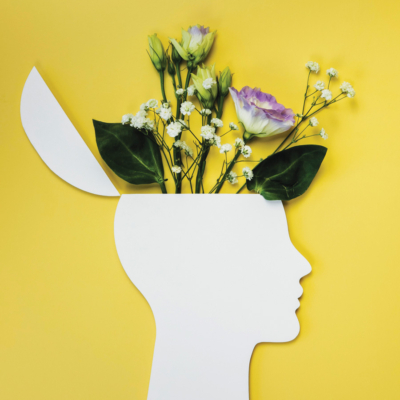How is it possible to endure the unendurable and what keeps the human spirit alive as the bombs rain down?
Small things make it possible to endure the unendurable in war. I recently asked Ukrainian army Lieutenant Yulia Mykytenko, whose story I have told in a book, if anything gives her joy on the front line in Donbas. Yes, Yulia smiled. In the smashed-up village where she and her platoon live, pets have been abandoned by fleeing civilians. Her unit adopted a stray dog they call Dvorianka, which can mean duchess or street-walker. After the reddish-brown mongrel gave birth, Mykytenko contacted an animal shelter in Kyiv which promised to place the entire litter in safe homes, far from the front line.
In a sane world, the safety of humans might take priority. Yulia has lost her husband, father and dozens of comrades to the war. In the madness of battle, where you can be obliterated by a two-tonne Russian glide bomb or chased by a buzzing drone that lobs grenades, taking care of helpless creatures is a way of clinging to one’s humanity. Last year, Petro, one of 25 men in Mykytenko’s reconnaissance platoon, asked to go on leave so he could be present at the birth of his first child. The unit ordered gifts for the baby on the internet. On the night when Petro returned to their derelict house, the soldiers sat in a circle on the floor near a wood stove and passed around a bottle of wine to celebrate the birth of his child. The profound sense of kinship which binds men and women who fight together helps them brave danger and hardship.
They also take courage from daring acts. On February 24 2022, the first day of Russia’s full-scale invasion of Ukraine, the Moskva, the flagship of the Russian navy in the Black Sea, ordered a 13-man unit on Snake Island to surrender. “Russian warship, go fuck yourself,” border guard Roman Hrybov famously responded. The defiant quotation was printed on T-shirts, posters, even a commemorative stamp. Journalists too find ways of keeping morale up. The simplest things give immense pleasure during war time. A hot meal. A bar of scented soap. A herogram from the editor. When the US and its allies bombed Baghdad for weeks in 2003, the awardwinning photographer James Nachtwey could be seen scrambling over bomb sites in impeccably ironed white shirts. I too made a point of careful grooming, through months of bombardments in Beirut, Belgrade and Baghdad.
A civil war joke said the Lebanese were the happiest people on earth because mains electricity and running water usually returned once every few days. It was perhaps frivolous, but also a great release, to go shopping when explosions subsided. A statue of a cat, which I purchased in Belgrade while it was under attack from NATO, stands watch at the top of my stairs. I treasure a small, inlaid Egyptian table, which my late former husband Robert Fisk carried ashore in Beirut port during a battle.
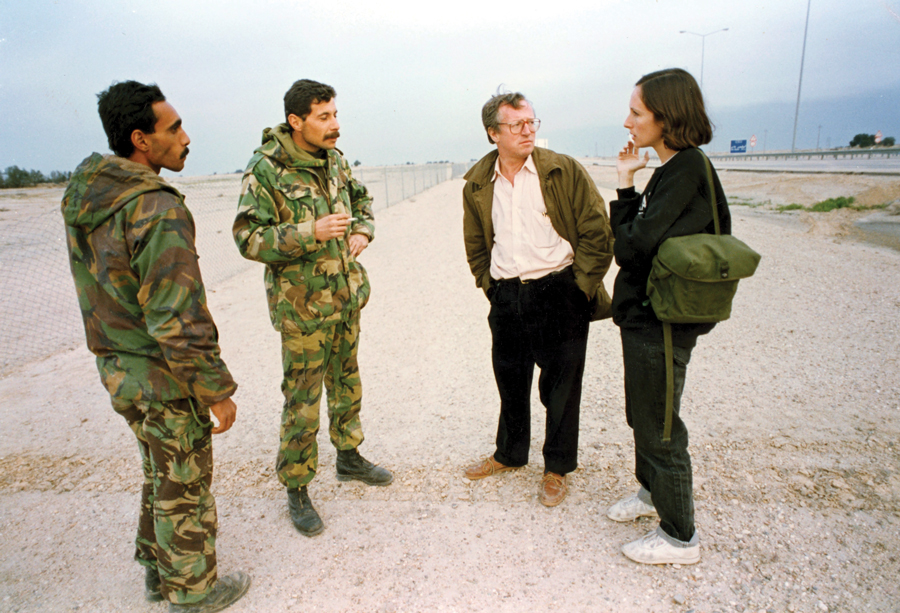
Marlowe with two Iraqi soldiers and Robert Fisk, February 1991.
In her frontline position, Lieutenant Mykytenko reads contemporary Ukrainian novels and watches Netflix to unwind. My colleague Lindsey Hilsum recently published I Brought the War With Me, a collection of the poems which kept her going through the many wars she has covered. I’ve never forgotten how Lindsey transformed Channel 4’s suite in the Palestine Hotel in Baghdad into a haven of civilisation. She played Beethoven over stereo speakers and cooked Spanish omelettes on a butane gas stove for friends.
Guillaume Apollinaire’s small volume Alcools accompanied me to several wars. The poet was nearly killed in the First World War and compared an exploding artillery shell to a flowering mimosa. “How violent is hope,” Apollinaire wrote. He referred to a love affair, but the observation is appropriate in war too. I have oftn seen hope die in war, only to creep back like ghosts. The ancient Greek poet Theocritus summarised it best: “While there is life, there is hope, and only the dead have none.”
Like most wars, the Ukraine war is producing its share of poetry. I chose Private Borys Humenyuk’s poem, “Testament” as the epigraph to a chapter in the book I published with Lieutenant Mykytenko. “Don’t send us back to our parents/We don’t want them to see us like this,” the poem begins. “With sapper shovels we are writing together/All over her body/The last poem of Ukrainian literature./We are still alive. We are still here,” it concludes.
When I tried to find Humenyuk to obtain permission to publish his poem, I learned that he has been missing in action since 2022. The Ukrainian army does not pronounce a soldier dead until their remains have been identified. Private Humenyuk almost certainly perished on the eastern front.
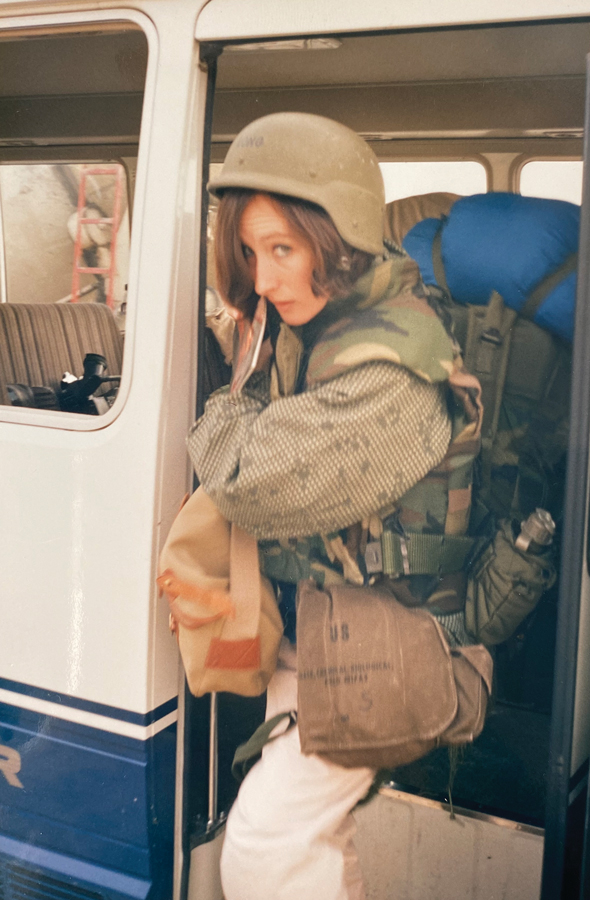
Marlowe disembarks from a press pool vehicle in Saudi Arabia during the Gulf War in 1991.
For combatants, civilians and sometimes for war correspondents, danger and discomfort become a new normal. Glad as she was to spend two weeks in Europe promoting our book last autumn, Lieutenant Mykytenko was homesick for her platoon back in Donbas. She has survived years of aerial and artillery bombardments, but she found the London tube at rush hour stressful. After a few weeks in a war zone, your body may return to Paris or Dublin, but your mind stays in Beirut, Gaza or Ukraine. On the taxi ride into Paris during a break from six months of artillery battles in Beirut in 1989, I caught myself searching for shell holes on Haussmann’s graceful façades. On the same trip, I almost dived under the seat in a cinema during a battle scene from Lawrence of Arabia.
I used to think that journalists had no right to talk about personal trauma when civilians suffer so much more in conflict. But our Palestinian and Lebanese colleagues are paying a terrible price in the present Middle East wars. The Committee to Protect Journalists reported in November 2024 that 134 journalists have been killed in Gaza, the West Bank, Israel and Lebanon since October 7 2023.
On April 18 1996, I witnessed the immediate aftermath of the Qana massacre, when Israel killed 106 Lebanese in the bombardment of the Fijian battalion headquarters of the United Nations Interim Force in Lebanon. For weeks afterwards, scenes of carnage replayed themselves before my eyes, as if projected on a visor above my forehead: blood flowing down the driveway; a headless baby hoisted by a Fijian soldier in the smouldering canteen; the woman who rocked back and forth cradling her dead father and crying, “Abi, Abi.” (Father, Father.) The Qana massacre remains a great sorrow to the families of the victims and to those who witnessed it. But I do not regret having been there, because injustice is compounded when war crimes are unreported and forgotten. More than 40 years have passed since, as a young researcher/associate producer for CBS News, I burst into tears at the sight of unimaginable misery in the Cité Soleil slum of Port-au-Prince, Haiti. I forced myself to adopt a certain detachment thereafter. Crying over human suffering accomplished nothing. It was more useful to write about it. With few exceptions, I have managed to keep my composure. Twice in 35 years I wept during interviews.
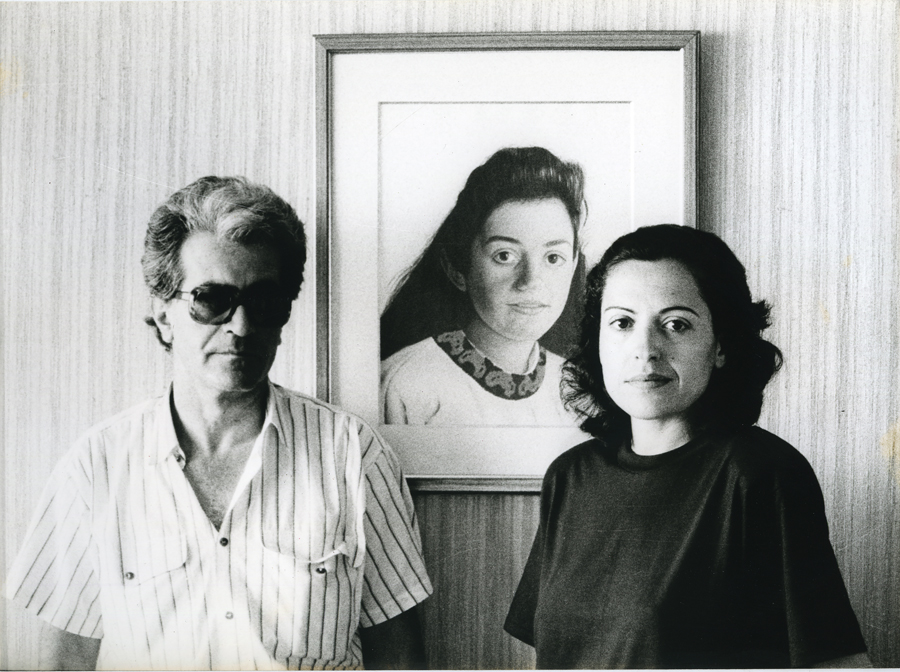
Lara Matar’s parents Ghassan and Maggie with a photo of their dead daughter.
The first time was in Beirut in 1989. Perhaps it was because of the similarities in our names, Lara Marlowe, Lara Matar, or because her father Ghassan was, like me, a journalist. The death of Lara Matar was one of the saddest, most moving stories that I ever reported. She was a child becoming a woman.
On November 8 1989, Ghassan Matar dropped Lara off at school. He asked why she was wearing make-up, and she replied, “Daddy, have you forgotten that today is my 17th birthday?” Ghassan was woken from his afternoon nap by the explosion of a car bomb a few blocks from the family home in west Beirut. Lara’s birthday cake was in a box on the kitchen counter. The phone rang. A family friend asked, “Where is your daughter?” Ghassan and his wife Maggie rushed to the hospital emergency room. “When we walked in, Lara’s friends threw their arms around us. That was when I knew what had happened,” Ghassan said.
Ghassan was 48, Maggie was 40. Lara was their only daughter. Maggie stopped work as a fashion designer. Ghassan published poems to his dead daughter and later became a deputy in the Lebanese parliament.
Had she lived, Lara Matar would be 52 years old today. I want us to remember her name, because she lives on in a way, for as long as her name is remembered. The second time I cried with the family of a war victim was at the funeral of Viktor Dudar, one of the first Ukrainian journalists to be killed in the full-scale invasion, in March 2022. There was something operatic about Dudar’s burial: the glowering sky, the woman kneeling before the casket, the immeasurable grief of Dudar’s widow Oksana and daughter Sophia as they stood beside his grave.
“While there is life, there is hope, and only the dead have none.”
Viktor Dudar was defence correspondent for Expres, Ukraine’s leading weekly news magazine. He went straight to the recruitment centre on the morning of February 24. When they said their goodbyes, Oksana told me, “My heart told me not to let him go, but I knew I could not change his mind. I told him it is better to be the widow of a hero than the wife of a coward. He was proud of me for saying that.” Experiencing a country at war teaches you what is really important. “It is much easier to see what is black and what is white,” Lieutenant Mykytenko told me the first time I interviewed her. Character is revealed more clearly. One sees who is good and who is bad. Covering wars has also made me realise how incredibly lucky I am to have lived most of my life in countries at peace.
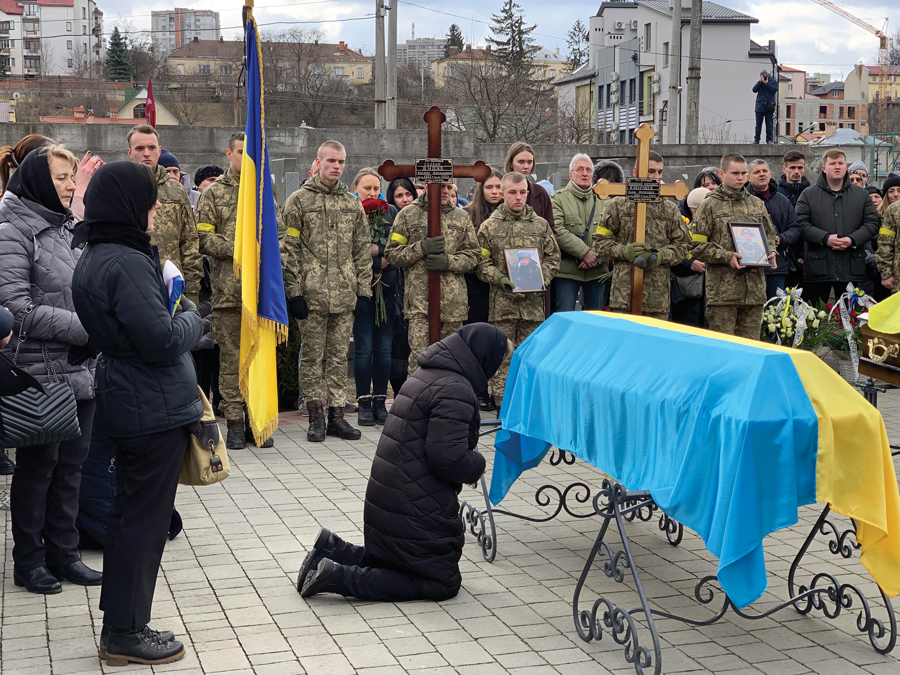
The funeral of Ukrainian journalist Viktor Dudar in March 2022.
George Bernard Shaw wrote that “the worst sin toward our fellow creatures is not to hate them, but to be indifferent to them”. Indifference was, he said, “the essence of inhumanity”.
When you have witnessed the courage and suffering of a people first-hand, their plight becomes important to you. I was devastated by Donald Trump’s election not only because of what it says about America, but because he can be expected to give free rein to Vladimir Putin and Benjamin Netanyahu in Ukraine and the Middle East. Two conflicts which I care about deeply appear likely to end in terrible injustice. Israel has virtually flattened Gaza and much of the West Bank and Lebanon since the Hamas atrocities of October 7 2023. As I watch news footage of dead women and children and pancaked apartment buildings, I am seized with a sickening sense of déjà vu, as if the slaughter I witnessed in Lebanon in 1993, 1996 and 2006, in Gaza in 2001, 2009 and 2014, were being played out ad infinitum on a sinister loop. When I visited Madrid with a dear friend, the Irish broadcaster Olivia O’Leary, we stood for a long time in front of Pablo Picasso’s masterpiece Guernica in the Reina Sofia Gallery.
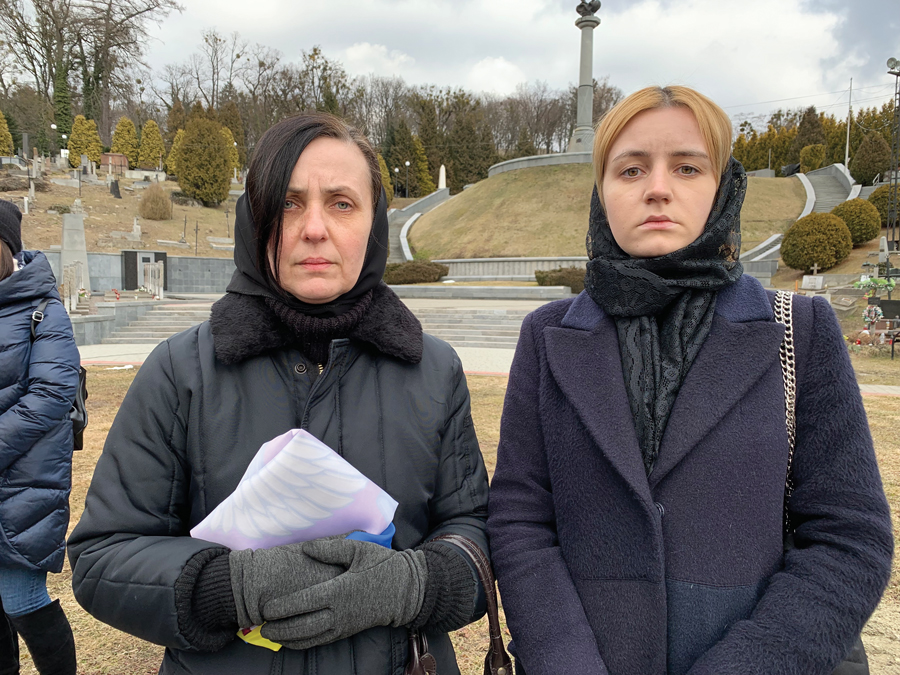
Viktor Dudar’s widow Oksana and daughter Sophia.
Picasso was enraged by the Luftwaffe bombing which killed more than 2,000 people in a Basque village in April 1937. We studied the face of the screaming mother clinging to her dead child, the man trampled by a horse, the fleeing woman dragging a broken leg behind her, the woman consumed by flames, the arm holding aloft a lamp, which we thought might be world opinion.
That day in September, more than 41,000 Palestinians had already been slain in Gaza in retaliation for the killing of about 1,200 Israelis by Hamas. The United Nations Office for the Coordination of Humanitarian Affairs had just reported the killing of 83 Lebanese civilians in 24 hours of Israeli attacks. About 100 museumgoers stood transfixed behind the cordon around Guernica. It was an extraordinary moment, when a painting nearly a century old expressed what all of us were thinking. There was hardly a murmur.
Lara Marlowe is the author of How Good It Is I Have No Fear of Dying: Lieutenant Yulia Mykytenko’s Fight for Ukraine (Head of Zeus, 2024) and Love in A Time of War: My Years with Robert Fisk (Head of Zeus, 2021).





